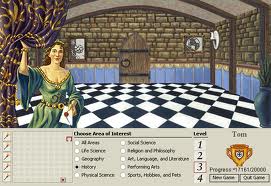The trivia game genre is often overlooked in favour of flashier more action packed pursuits. Add in an educational element and man’s quest for knowledge is put well and truly on the back burner in favour of cheap thrills and mindless entertainment. I will try to protect the aura of suave sophistication I have built up and try my best not to sound too nerdy but I have always been a fan of these kinds of games. There is no bigger thrill I can think of than pitting myself against the toughest quizzes gaming has to offer and it’s probably because one of the first games I ever played was the Mindmaze included as part of the Encarta.
Bundled in with the Microsoft Encarta encyclopaedia package the Mindmaze was a trivia challenge for the ages. The player character had to navigate the maze of passages on each floor of a castle answering questions as you enter each room. Successfully answering would allow you passage to the next and you would accumulate points towards an overall goal. To make it easier (or harder) you can narrow down the list of questions by selecting from a list of categories. If you are struggling, the game offers you hints from relevant encyclopaedia pages and to broaden your mind might just offer you background information anyway.
In my mind this game is a wonderful blend of the TV show Knightmare (Google it if you’ve never seen it) and the fun kind of quiz where you don’t actually realise you are learning. The castle seemed full of adventure and was populated by an (admittedly tiny) cast of characters who provided the one of the flimsiest backstories ever created. The medieval setting is an enjoyable fantasy interpretation but confusingly inaccurate for a product drawing its gameplay from an encyclopaedia. Despite this I can’t really argue with a game that allows you to progress through royal society based on your intelligence rather than strength and breeding.
There is the odd slightly counter intuitive design decision that subtracts from the overall experience slightly. The questions are timed with higher points going to faster answers. This scoring system then ties in with how quickly you are reward for completing the main quest. However, I found this discouraged me from using the encyclopaedia links to investigate the answers and instead lead to my memorising of the facts in an effort to get as many points as possible. As an eight year old British child I had a vast knowledge of American leisurely pursuits with no context or way of applying what I had learned. For example, did you know that Gene Sarazen was part of the first admission class for the World Golf Hall of Fame? I did. I had no context or means to use the information that I had gathered but thanks to Encarta I knew this fact. In addition this memorising also caused me to see fewer questions per game which seems to be the opposite outcome to the games design goal. This definitely feels like a throwback to the early nineties trend of pretty much every game keeping a score even when unsuitable for the game mechanics or just confusing.
These complaints are just nitpicking however as I played and enjoyed the game so much probably saw all of the questions on offer anyway. Encarta Mindmaze is a fantastic idea that really proves learning can be fun. I honestly cannot think of another game that encourages players to spend an afternoon reading the encyclopaedia. A browser based or app based version of this game operating around Wikipedia would be a brilliant way to encourage positive learning based gameplay. Sadly, as Encarta has been discontinued and there appears to be no way to find the game individually it may be that future players of this game need to find increasingly outdated versions to get their fix. This means that you might be learning out of date information but I’m sure you’ll still have lots of fun anyway.



